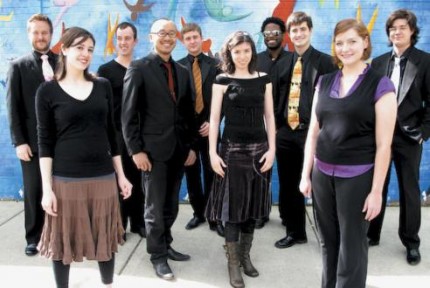Anaphora brings youthful edge to traditional program
Anaphora, an ever-morphing ensemble of young Chicago-based musicians who are best known for their engagement with contemporary music, chose to open their season this year with a program of traditional chamber works. The players more than held their own in this unaccustomed territory, capping Monday’s performance at the Music Institute of Chicago’s Nichols Concert Hall with a deeply satisfying traversal of the Brahms Clarinet Quintet, one of the cornerstones of the European chamber repertoire. It was a pity that the audience for this fine concert was so sparse.
The youth of the musicians added a welcome edge to the quintet, a work often called “autumnal.” This late Brahms essay is usually played with a dream-like, otherworldly quality, the clarinet melding into the string quartet texture as a first among equals.
While this was generally true of Anaphora’s approach, the emotional peaks offered by the score were more vigorously attacked, providing a landscape of contrasts and, often, a riveting intensity.
The quintet’s structural integrity was evident from start to finish. The extensive first movement was initiated by the string quartet (Aurelien Pederzoli and Sang Mee Lee, violins, Dave Moss, viola and Craig Trompeter, cello) joined almost immediately by the ingratiating clarinet of Cory Tiffin in a song-like theme that recurs throughout the work. The musicians demonstrated a close accord that was clearly due to a long association, and rose to the moments of climax with vigor and authority.
The second movement Adagio was well-paced and sweetly on key, with Trompeter’s patrician tones in evidence and the whole movement under tight control, maintaining tension throughout the long lines of extended melody. The brief Andantino was brisker and gave some action to the clarinet and violins. All the movements, including the final Con Moto theme and variations, displayed a corporate consonance and pacing, each offering a mix of lush harmonics and more aggressive moments which subside into a final solemnity.
The first half of the program was a mixed bag of chamber works, highlighted by Prokofiev’s pungent Overture on Hebrew Themes, which united the string quartet (Paula Kosower was the cellist for this piece) and pianist Daniel Schlosberg with Cory Tiffin’s resilient clarinet. This is a good-humored short work with its klezmer-like theme and some solo turns as well as a resounding finale delivered with brio.
Mozart’s Duo for violin and viola K. 423 was substituted for the announced Divertimento (String Trio) K. 563, one of Mozart’s finest chamber works. The Duo was stylishly handled by both instrumentalists, Pederzoli’s muscular violin contrasting with the plump resonance of Dave Moss’s viola with fleeting intonation issues in the exposed slower section.
The group’s commitment to offbeat repertoire was represented by a five-minute work by Charles Ives: the Largo movement from a discarded violin sonata arranged for clarinet, violin and piano. All the composer’s trademarks were there: aberrant tonality, aggressive attacks and atmospheric scene painting. The violinist for this piece was Jaime Gorgojo, a recent addition to Anaphora.
Anaphora returns to contemporary territory for a program of music by Chicago composers 2 p.m. November 25 at The Green Mill. The program includes Marcos Balter’s à vis, Seth Boustead’s Dissonance Still Talking, Ilya Levinson’s Shadows based on sculptures of Herbert George and the world premieres of George Flynn’s complete Three Diversions for woodwind quintet and a new work from Sarah J. Ritch. anaphoraensemble.com
Posted in Performances





